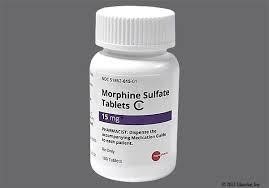A nurse is caring for a client who is receiving morphine for pain. Which of the following findings indicates that the client is experiencing an adverse effect of the medication?
Hypertension
Lacrimation
Tachycardia
Urinary retention
The Correct Answer is D
Choice A Reason:
Hypertension (high blood pressure) is not a common adverse effect of morphine. Opioid medications are more likely to cause hypotension (low blood pressure).
Choice B Reason:
Lacrimation (excessive tearing) is not a typical adverse effect of morphine. Opioids can cause dry mouth and decreased tear production.
Choice C Reason:
Tachycardia (rapid heart rate) is not a common adverse effect of morphine. Morphine and other opioids are more likely to cause bradycardia (slow heart rate) or a decrease in heart rate.
Choice D Reason:
Urinary retention is an adverse effect associated with opioid medications like morphine. Opioids can cause relaxation of smooth muscles, including those in the urinary bladder, which can lead to difficulty or inability to urinate.

Nursing Test Bank
Naxlex Comprehensive Predictor Exams
Related Questions
Correct Answer is C
Explanation
Grapes are round and can easily get stuck in a child's throat, leading to choking. The other foods listed (corn, oranges, and potatoes) are less likely to cause choking because they can be cut into smaller pieces or are less likely to get stuck in a child's airway.
Correct Answer is A
Explanation
Choice A Reason:
Determine the client's pattern for voiding. Understanding the client's current voiding pattern and habits is essential in developing a personalized bladder training plan. This information helps in identifying when and how often the client typically voids, which is crucial for planning the timing of toileting opportunities and other interventions.
Choice B Reason:
Assisting the client with relaxation techniques may be part of the bladder training program but is not the first step. First, you need to assess the client's current voiding pattern to establish a baseline.
Choice C Reason:
Discouraging intake of carbonated beverages may also be part of the plan, but it's not the initial step. Assessment and establishing a baseline come first.
Choice D Reason:
Offering toileting opportunities every 1 to 2 hours is a key component of bladder training, but before implementing this, you should assess the client's current voiding pattern to determine if these
Whether you are a student looking to ace your exams or a practicing nurse seeking to enhance your expertise , our nursing education contents will empower you with the confidence and competence to make a difference in the lives of patients and become a respected leader in the healthcare field.
Visit Naxlex, invest in your future and unlock endless possibilities with our unparalleled nursing education contents today
Report Wrong Answer on the Current Question
Do you disagree with the answer? If yes, what is your expected answer? Explain.
Kindly be descriptive with the issue you are facing.
